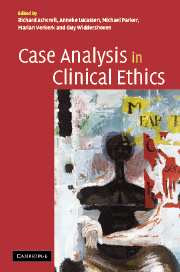Book contents
- Frontmatter
- Contents
- Notes on contributors
- Acknowledgements
- 1 Philosophical introduction: case analysis in clinical ethics
- 2 Families and genetic testing: the case of Jane and Phyllis
- 3 Family access to shared genetic information: an analysis of the narrative
- 4 A virtue-ethics approach
- 5 Interpretation and dialogue in hermeneutic ethics
- 6 ‘Power, corruption and lies’: ethics and power
- 7 Reading the genes
- 8 A utilitarian approach
- 9 A feminist care-ethics approach to genetics
- 10 A conversational approach to the ethics of genetic testing
- 11 Families and genetic testing: the case of Jane and Phyllis from a four-principles perspective
- 12 A phenomenological approach to bioethics
- 13 An empirical approach
- 14 Response to ethical dissections of the case
- 15 Philosophical reflections
- Index
- References
1 - Philosophical introduction: case analysis in clinical ethics
Published online by Cambridge University Press: 01 September 2009
- Frontmatter
- Contents
- Notes on contributors
- Acknowledgements
- 1 Philosophical introduction: case analysis in clinical ethics
- 2 Families and genetic testing: the case of Jane and Phyllis
- 3 Family access to shared genetic information: an analysis of the narrative
- 4 A virtue-ethics approach
- 5 Interpretation and dialogue in hermeneutic ethics
- 6 ‘Power, corruption and lies’: ethics and power
- 7 Reading the genes
- 8 A utilitarian approach
- 9 A feminist care-ethics approach to genetics
- 10 A conversational approach to the ethics of genetic testing
- 11 Families and genetic testing: the case of Jane and Phyllis from a four-principles perspective
- 12 A phenomenological approach to bioethics
- 13 An empirical approach
- 14 Response to ethical dissections of the case
- 15 Philosophical reflections
- Index
- References
Summary
Medical ethics has had a rich and complex history over the past 40 years. It has been transformed from a rather clear and straightforward set of rules and attitudes, shaped largely by the medical profession itself, into a major field of academic and social inquiry. Contemporary work in medical ethics can be divided into three parts: ethical analysis and arguments of large-scale issues in science, practice and policy (such as consideration of the ethical issues concerning cloning or resource allocation); theoretical inquiry into the foundations of medical ethics; and practical analysis of particular dilemmas in clinical practice. This last area in medical ethics is normally referred to as clinical ethics, and is in many respects the most important and vibrant part of medical ethics today. It lives through its intimate connection with clinical practice and medical and healthcare education, the ways in which suggestions made by practitioners of clinical ethics are rapidly tested in clinical reality, and the growth of a practical field of work in which ‘ethicists’ support patients, professionals and ethics committees in making good decisions in difficult circumstances.
For all this vibrant growth, there has been some unease with the way clinical ethics has developed. Healthcare professionals are sometimes baffled by the argumentative curlicues of the philosophers; patients and activists are often suspicious that all this ‘ethics’ is just a way of reinforcing existing professional attitudes and authority, and that ethicists are just as blind to patients' concerns as the medical professionals; and philosophers are generally infuriated by the apparent laziness and lack of rigour of their ‘applied’ colleagues.
- Type
- Chapter
- Information
- Case Analysis in Clinical Ethics , pp. 1 - 6Publisher: Cambridge University PressPrint publication year: 2005
References
- 2
- Cited by

